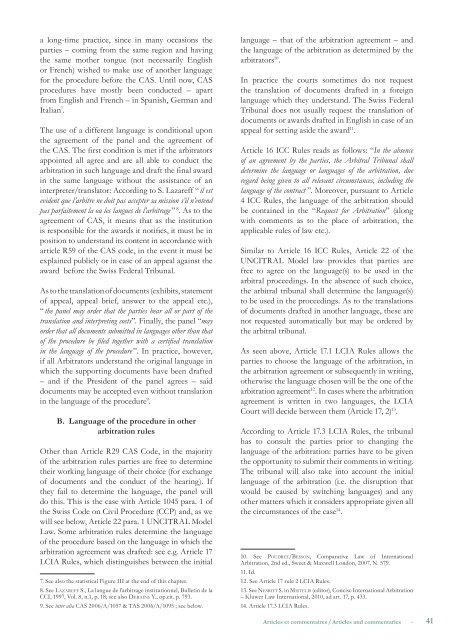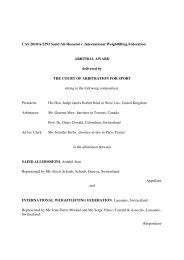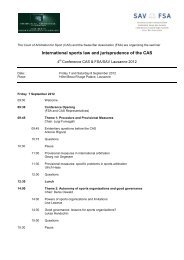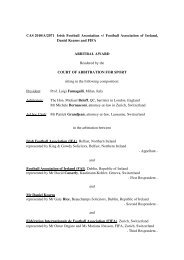(CAS) Bulletin - Tribunal Arbitral du Sport / TAS
(CAS) Bulletin - Tribunal Arbitral du Sport / TAS
(CAS) Bulletin - Tribunal Arbitral du Sport / TAS
Create successful ePaper yourself
Turn your PDF publications into a flip-book with our unique Google optimized e-Paper software.
a long-time practice, since in many occasions the<br />
parties – coming from the same region and having<br />
the same mother tongue (not necessarily English<br />
or French) wished to make use of another language<br />
for the proce<strong>du</strong>re before the <strong>CAS</strong>. Until now, <strong>CAS</strong><br />
proce<strong>du</strong>res have mostly been con<strong>du</strong>cted – apart<br />
from English and French – in Spanish, German and<br />
Italian 7 .<br />
The use of a different language is conditional upon<br />
the agreement of the panel and the agreement of<br />
the <strong>CAS</strong>. The fi rst condition is met if the arbitrators<br />
appointed all agree and are all able to con<strong>du</strong>ct the<br />
arbitration in such language and draft the fi nal award<br />
in the same language without the assistance of an<br />
interpreter/translator: According to S. Lazareff “ il est<br />
evident que l’arbitre ne doit pas accepter sa mission s’il n’entend<br />
pas parfaitement la ou les langues de l’arbitrage ” 8 . As to the<br />
agreement of <strong>CAS</strong>, it means that as the institution<br />
is responsible for the awards it notifi es, it must be in<br />
position to understand its content in accordance with<br />
article R59 of the <strong>CAS</strong> code, in the event it must be<br />
explained publicly or in case of an appeal against the<br />
award before the Swiss Federal <strong>Tribunal</strong>.<br />
As to the translation of documents (exhibits, statement<br />
of appeal, appeal brief, answer to the appeal etc.),<br />
“ the panel may order that the parties bear all or part of the<br />
translation and interpreting costs”. Finally, the panel “may<br />
order that all documents submitted in languages other than that<br />
of the proce<strong>du</strong>re be fi led together with a certifi ed translation<br />
in the language of the proce<strong>du</strong>re ”. In practice, however,<br />
if all Arbitrators understand the original language in<br />
which the supporting documents have been drafted<br />
– and if the President of the panel agrees – said<br />
documents may be accepted even without translation<br />
in the language of the proce<strong>du</strong>re 9 .<br />
B. Language of the proce<strong>du</strong>re in other<br />
arbitration rules<br />
Other than Article R29 <strong>CAS</strong> Code, in the majority<br />
of the arbitration rules parties are free to determine<br />
their working language of their choice (for exchange<br />
of documents and the con<strong>du</strong>ct of the hearing). If<br />
they fail to determine the language, the panel will<br />
do this. This is the case with Article 1045 para. 1 of<br />
the Swiss Code on Civil Proce<strong>du</strong>re (CCP) and, as we<br />
will see below, Article 22 para. 1 UNCITRAL Model<br />
Law. Some arbitration rules determine the language<br />
of the proce<strong>du</strong>re based on the language in which the<br />
arbitration agreement was drafted: see e.g. Article 17<br />
LCIA Rules, which distinguishes between the initial<br />
7. See also the statistical Figure III at the end of this chapter.<br />
8. See LAZAREFF S., La langue de l’arbitrage institutionnel, <strong>Bulletin</strong> de la<br />
CCI, 1997, Vol. 8, n.1, p. 18; see also DERAINS Y., op.cit. p. 793.<br />
9. See inter alia <strong>CAS</strong> 2006/A/1057 & <strong>TAS</strong> 2006/A/1095 ; see below.<br />
language – that of the arbitration agreement – and<br />
the language of the arbitration as determined by the<br />
arbitrators 10 .<br />
In practice the courts sometimes do not request<br />
the translation of documents drafted in a foreign<br />
language which they understand. The Swiss Federal<br />
<strong>Tribunal</strong> does not usually request the translation of<br />
documents or awards drafted in English in case of an<br />
appeal for setting aside the award 11 .<br />
Article 16 ICC Rules reads as follows: “In the absence<br />
of an agreement by the parties, the <strong>Arbitral</strong> <strong>Tribunal</strong> shall<br />
determine the language or languages of the arbitration, <strong>du</strong>e<br />
regard being given to all relevant circumstances, including the<br />
language of the contract ”. Moreover, pursuant to Article<br />
4 ICC Rules, the language of the arbitration should<br />
be contained in the “Request for Arbitration” (along<br />
with comments as to the place of arbitration, the<br />
applicable rules of law etc.).<br />
Similar to Article 16 ICC Rules, Article 22 of the<br />
UNCITRAL Model law provides that parties are<br />
free to agree on the language(s) to be used in the<br />
arbitral proceedings. In the absence of such choice,<br />
the arbitral tribunal shall determine the language(s)<br />
to be used in the proceedings. As to the translations<br />
of documents drafted in another language, these are<br />
not requested automatically but may be ordered by<br />
the arbitral tribunal.<br />
As seen above, Article 17.1 LCIA Rules allows the<br />
parties to choose the language of the arbitration, in<br />
the arbitration agreement or subsequently in writing,<br />
otherwise the language chosen will be the one of the<br />
arbitration agreement 12 . In cases where the arbitration<br />
agreement is written in two languages, the LCIA<br />
Court will decide between them (Article 17, 2) 13 .<br />
According to Article 17.3 LCIA Rules, the tribunal<br />
has to consult the parties prior to changing the<br />
language of the arbitration: parties have to be given<br />
the opportunity to submit their comments in writing.<br />
The tribunal will also take into account the initial<br />
language of the arbitration (i.e. the disruption that<br />
would be caused by switching languages) and any<br />
other matters which it considers appropriate given all<br />
the circumstances of the case 14 .<br />
10. See POUDRET/BESSON, Comparative Law of International<br />
Arbitration, 2nd ed., Sweet & Maxwell London, 2007, N. 579.<br />
11. Id.<br />
12. See Article 17 rule 2 LCIA Rules.<br />
13. See NESBITT S. in MISTELIS (editor), Concise International Arbitration<br />
– Kluwer Law International, 2010, ad art. 17, p. 433.<br />
14. Article 17.3 LCIA Rules.<br />
Articles et commentaires / Articles and commentaries<br />
-<br />
41





